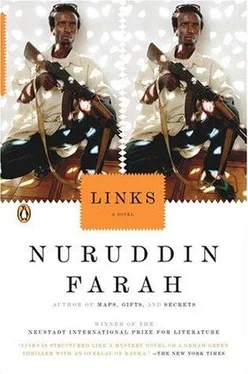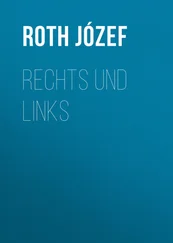“May I ask how the girls got here?” Jeebleh said.
“From what Raasta’s told me,” Faahiye replied, “they were picked up in a fancy car and taken to some house where they were kept in the basement for several weeks.”
“Do they have any idea who picked them up?”
“You should ask Raasta yourself when you see her.”
“I will.”
He listened to the lowing of a cow calling to one of its young. There were cows everywhere, cows communicating their mourning, grieving, lamenting their endangered state, and making sounds that frightened the daylights out of you. A young moon framed by clouds was up in the sky. A curious unease descended on Jeebleh at the sight of a young calf and an older cow fighting over a plastic bag, their horns colliding, both hurting. The tough, translucent material was torn apart, and the older one took a mouthful of it, while the calf stood apart, forlorn and hungry. Several other bags flew into the air, and were blown away to finish flat against a wire fence.
Jeebleh whispered: “Who owns the place?”
Faahiye answered in a mumble, “I have yet to find out myself. Remember, I just got back here.”
“Who brought you from the airport, then?”
Faahiye didn’t respond. They had come to a gate, at which he tapped hard three times, quick and uninterrupted. The voice of a woman from inside the house told them to wait. Then Makka came out to open the gate, saw Jeebleh, and ran off, back into the house, giggling.
HAVING PRECEDED THEM INTO THE HOUSE, MAKKA HID BEHIND THE DOOR playfully, then came out with the joy of a child welcoming a frolicsome parent. Faahiye took part in the fun with self-abandonment, laughing and loving too. Makka adored him, that much was clear. Instead of asking where Raasta was, Jeebleh watched Makka romp about with Faahiye. When she stopped, exhausted, the sun gathered in her eyes, and her tranquil features were even more of a delight.
She mumbled something in the tawdry tongue of a Marlon Brando doing his Sicilian bit, his cheeks heavy with cotton. Faahiye must have understood her question, for he replied, “His name is Uncle Jeebleh!” She watched him with wary eyes and kept her distance, biting her nails. She didn’t come rushing to hug him, as he had expected.
She turned to Faahiye instead, and gave him kisses and hugs, pleased to be holding his hand and fiddling with his fingers. There was such warmth there, gentle, tender, and sweet, even without another word exchanged between them. She waited with childish anxiety for him to return her affections, while he was eager to attend to his guest. When he did kiss her fingers and then her cheeks, her face beamed with the glee of the innocent.
Makka stared at Jeebleh, as if deciding whether he belonged inside or outside the circle of persons to whom she gave kisses and hugs. She hesitated, unsure of what to do, until Faahiye encouraged her: “Go on!” She went to Jeebleh, grinning, her hand outstretched. In her way, she was commiserating with him; or was she apologizing for having taken her time? She pulled herself to her full height and, in an instant, was touching and hugging him, kissing him on both cheeks, before letting him go. She might have been expecting to hear Faahiye’s approval for what she had done, and looked sad when neither man moved or spoke.
Jeebleh asked, “Why here?”
Surprising both of them, and maybe even herself, Makka answered. You could see how hard she worked at making herself understood, her forehead furrowed in concentration. Before speaking, she made a sucking noise, reclaiming the saliva hanging from her lower lips by drawing it in noisily. “No here, here!” she said.
Jeebleh didn’t ask for an explanation, either from her or from Faahiye. But he remembered the Arab wisdom that from the mouths of the simple you may receive something profound.
“No here, here!” she repeated several times. And again she was on her feet, pointing at herself and repeating, “Aniga anigoo ah,” many times. Then she went over to Jeebleh, touched his hair, first the cut side, then the uncut, and giggled excitedly. She mumbled something that Faahiye interpreted for him. “She is saying you are fun and she likes you.”
Then the world became a door, and a young girl, age indistinct, walked in. What impression did Raasta make on Jeebleh when he first laid eyes on her? He held two conflicting images in his head at one and the same time. He thought of a potholed feeder road, neglected to the point where it was hardly used, and therefore decidedly quiet and off-peak. Then he thought of a commuter train at rush hour in a big city, packed with workers jostling for standing space in the car into which they had squeezed themselves when the doors opened. It could be that he was already thinking to his return home, now that he had found the girls.
The moment grew in importance; things weren’t going to be the same from then on. Raasta was in her own element.
She walked over to her father, whom she embraced, then kissed. And when at long last she came to where Jeebleh was, he didn’t rise; instead, he went into a crouch, half kneeling, and waited. He didn’t want to be daring; this was not the moment to be brave, take her in his arms, lift her up and plant on her cheeks warm, loving kisses. He let her determine what was to happen. So she embraced him as you embrace someone dear to you, not because you know him but because you’ve heard his name mentioned often and in an endearing way. She knew how to draw lines, Raasta did. She said to him, in as grown-up a tone of voice as she could muster under all the excitement, “I’m very glad to meet you, Uncle Jeebleh!”
Then because Makka was giggling, her finger pointing at Jeebleh’s hair, Raasta put her hand on her lips, both to suggest that Makka stop misbehaving and to stop herself from giggling too. Jeebleh touched the uncut side and said to the girls, “Do you like my haircut?”
They both nodded, giggling.
And then silence.
There was no denying the fact that together and in such a setting, they represented joy itself, their expressions set in happiness, their smiles genuine, and the words they used connecting them lovingly. There was something malleable about their togetherness, as manageable and pliant as dough in the hands of an expert baker. Raasta looked away with amusement every time her gaze fell on Jeebleh’s hair. Makka came and touched it again, and then giggled for a long time.
“Who or what did you see on the way here?” Raasta now asked her father.
“We saw a cow chewing a bag, choking!”
The news upset Raasta, who said reproachfully, “Why do you do that sort of thing, talk about a cow dying in misery, when we’re doing our best to welcome Uncle Jeebleh?”
“I’m sorry, my sweet!” he apologized.
And he held the two girls to himself, hugging and kissing them. Makka, though not ill at ease, freed herself from his embrace. She took Raasta’s face in her hands, a face in the shape of an infant moon, then demonstrated a clock face with her arms, the minute and hour hands in slow forward motion. Faahiye wore a soft, tender smile as he clowned for Makka, who laughed. Jeebleh stood fascinated, moved to see them all together and happy.
Jeebleh admired the handsome features of the house: high ceilings, exquisite furniture, tiled kitchen floor, fittings still intact, clean and lovely. When he saw the dishes washed, drip-drying in the kitchen, the tea towels clean and hanging where they should, the fresh flowers in the vase on the dining table, he remembered the desolate life that Shanta had been leading, and he was sad. He wondered whether there was another adult sharing the house with the three of them — most probably a woman?
“What would you like us to do now?” Faahiye said.
Читать дальше












